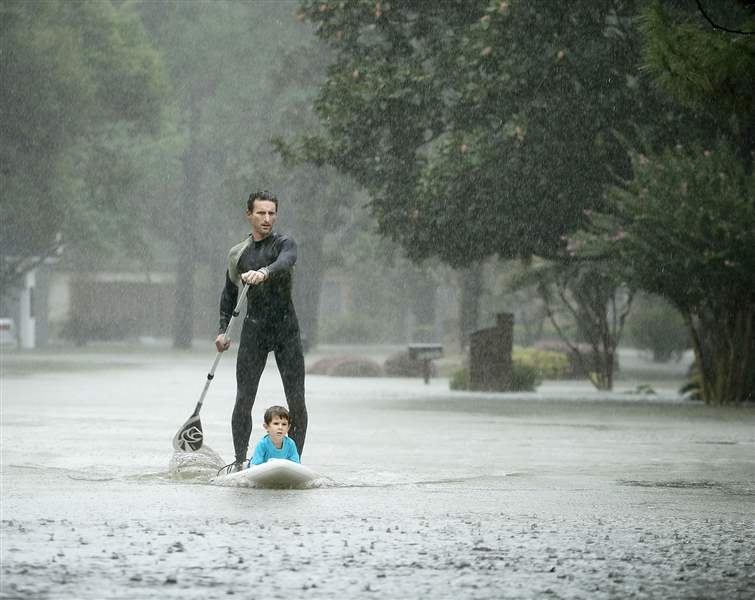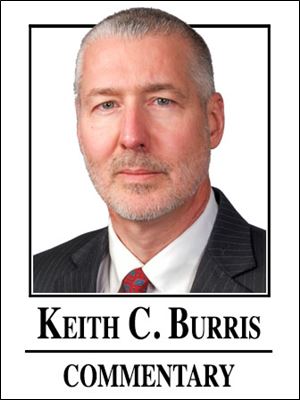
Why we have government
9/3/2017
Alexendre Jorge evacuates Ethan Colman, 4, from a neighborhood inundated by floodwaters from Tropical Storm Harvey in Houston. Natural disasters like Harvey suddenly make government vital in the eyes of all.
ASSOCIATED PRESS

Jerry Brown, who has twice in my lifetime been the two-term governor of California (when he was a wunderkind and later when he was an unflappable old man), once said something that I love. He said he learned more from James Taylor’s song “Fire and Rain,” than he learned in Yale Law School.
In the same spirit I offer this paragraph, which contains as much wisdom as I gained in graduate school (though I learned much there):
“The central conservative truth is that it is culture, not politics, that determines the success of a society. The central liberal truth is that politics can change a culture and save it from itself.”
It comes from Daniel Patrick Moynihan, one of the great thinker-writer-politicians of the last century, and indeed of American history.
Mr. Moynihan wrote a lot of books. These two sentences are the best things he wrote.
The American culture — its drive for learning and personal edification; its passion for fairness; its love of the underdog; its exultation of the individual; its dedication to open spaces and the land; its celebration of sports; its lifting up of servant leaders like cops and soldiers; its invention of jazz and American cinema — is what has made us great.
Our politics has only occasionally made us great. American ideas and innovators have shaped us — from Henry Ford to Billie Holiday.
But one would have to include Jefferson, John Adams, James Madison, and, later, Lincoln and Martin Luther King, Jr., among the inventors of singular American lives.
Without Madison, we have no country. Without Lincoln we would have lost the link between founding principles and the gritty, often doomed, craft of politics. Without King, human rights would have slipped away from the center of the American experiment — the country would have lost its soul.
Mr. Moynihan was right. We are always more than our politics. But our politics can sometimes nudge us toward what we want to be. The Declaration, the Constitution, the Bill of Rights, Lincoln’s address at Gettysburg and his Second Inaugural — these are expressions of the American character, as well as creed.
The Civil Rights movement was politics. It also changed our culture.
And what is the prosaic, work-a-day expression of politics? Government.
Let’s admit that American government is often a mess, though the intentions are almost always good — from public housing to Obamacare. Lyndon B. Johnson’s Great Society, which was intended to simply extend the New Deal, created the welfare state and a culture of entitlement and dependency. Why, asked the critic and economist Thomas Sowell, was the public housing of his childhood usually extraordinarily well kept by renters whereas today it is generally atrociously kept?
That’s the culture of poverty — poverty not as economics but an expression of despair. That’s the culture of “toxic charity.”
During Ronald Reagan presidency, young black men were entering the job market, not prisons. That was politics moving culture, too.
I look at Hurricane Harvey and the city of Houston, where one of my sisters lives, and I think two things:
1) This is why we have government.
2) Maybe government, in this instance, can move our culture toward compassion and community.
Have you noticed that there is no one in Houston cursing the government?
No one in Texas is talking about the terrible feds, or high taxes, or the dreaded swamp of Washington.
None of the politicians who opposed aid for the victims of Hurricane Sandy, on the East Coast four years ago, are talking about self-reliance, or boot straps, or Ayn Rand after Harvey.
No. They are all saying: Washington, help Texas.
They are all, led by President Trump, saying: We need FEMA. We need Federal Emergency Management Agency professionals to be good at what they do. And we need them to stay in Texas.
FEMA is the feds. We have met the enemy, and they are our saviors.
Government is too approximate a science to work well most of the time. Most “help the poor” programs fail, actually oppress the poor, and only support do-gooding yuppies and dweebs. But government, when it works, can save lives. And there are times when only it can. The Coast Guard is government.
For all its imperfections, government is the practical expression of American compassion — of the American concept that when someone needs a helping hand, we lend it.
You’re damn right we need FEMA. And we need the National Parks Service too. And the FAA. And the EPA, and the Department of Agriculture.
The culture wars will proceed apace. My own view is that we need a resurgence of individual liberty and responsibility. And of faith — private faith, not public faith. I agree with the Founders, it does not matter, to the function of democracy, whether a person affirms Buddhism or Hinduism or Christianity, a republic needs citizens who believe in something.
But, we will also always need competent government. Whether you think of World War II or Korean or Vietnam and Afghanistan vets, or firefighters entering the Twin Towers on 9/11, or FEMA bringing relief to the people Texas, government is the concrete manifestation of e pluribus unum.
And when it comes to the aid of people who desperately need help, government can perhaps push a divided culture back toward mutual respect.
Keith C. Burris is an editorial page editor of The Blade. Contact him at kburris@theblade.com or 419-724-6266.